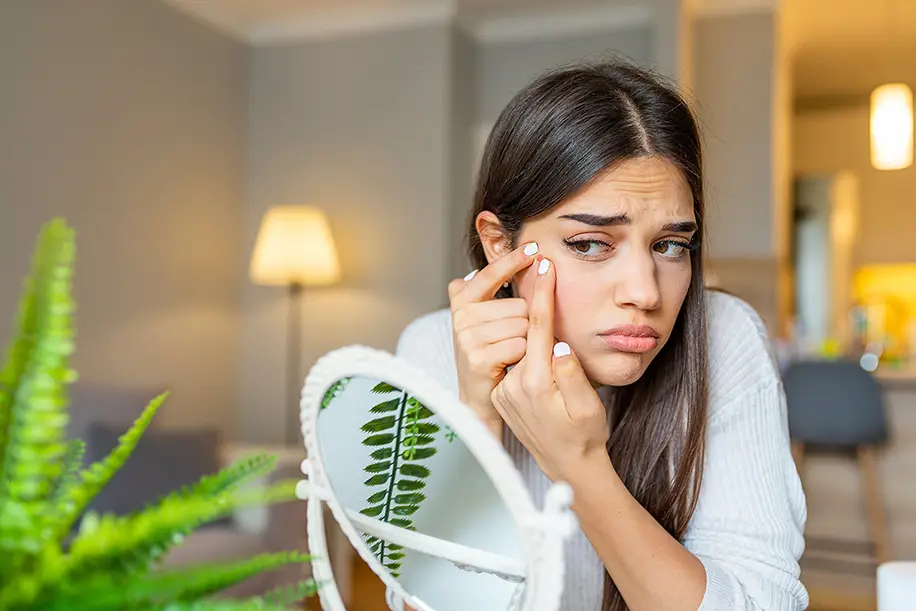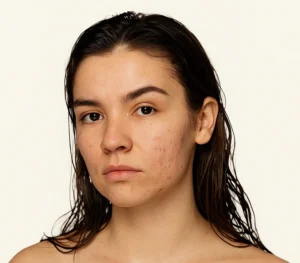Acne Is Caused by Poor Hygiene
No, acne is not caused by poor hygiene.
Contrary to popular belief, acne is not the result of dirty skin or not washing your face enough. Acne actually stems from a combination of factors like genetics, hormones, and clogged pores. When your skin produces excess oil (sebum), it mixes with dead skin cells and bacteria, clogging pores and causing inflammation. Overwashing your face can make things worse by stripping the skin of its natural oils, leading to irritation and more oil production, which can aggravate acne. So, while cleansing is important, obsessively scrubbing your skin won’t prevent acne—and may even worsen it.
Only Teenagers Get Acne
No, adults can get acne too.
Though acne is commonly associated with adolescence, it’s not just a teenage problem. Adults in their 20s, 30s, 40s, and even 50s can suffer from breakouts. Hormonal fluctuations, stress, and lifestyle factors like diet and skincare products all play a role in adult acne. In fact, adult-onset acne, particularly in women, is becoming more common. Hormonal imbalances, such as changes during pregnancy, menstrual cycles, or menopause, can trigger acne at any age. So, if you’re dealing with acne as an adult, you’re definitely not alone.
Eating Greasy Foods Causes Acne
No, eating greasy foods doesn’t directly cause acne.
It’s a widespread belief that eating pizza or french fries will lead to breakouts, but that’s not entirely true. While diet does affect your skin, the connection between greasy foods and acne isn’t as direct as you might think. Acne is more influenced by hormones, excess oil production, and clogged pores. That said, high-glycemic foods—like refined sugars and carbs—can spike insulin levels, which may lead to inflammation and potential breakouts in some individuals. But in general, eating greasy foods alone won’t result in acne.
Sun Exposure Clears Up Acne
No, sun exposure does not clear up acne.
The idea that tanning or spending time in the sun will “dry out” pimples is a myth. While it may seem like the sun temporarily improves acne by drying out the skin, UV exposure can actually make things worse. Over time, sun damage increases oil production and can lead to clogged pores, exacerbating acne. Moreover, exposure to UV rays can worsen acne scars and increase the risk of skin cancer. It’s crucial to use sunscreen daily, even if you’re dealing with acne, to protect your skin and prevent long-term damage.
Popping Pimples Makes Them Go Away Faster
No, popping pimples makes things worse.
It’s tempting to pop a pimple, but doing so can actually lead to more harm than good. When you squeeze a pimple, you risk pushing bacteria and oil deeper into the skin, which can cause more inflammation and potentially create even more breakouts. Popping pimples also increases the chance of scarring and hyperpigmentation. Instead of picking at your skin, it’s better to let pimples heal on their own or use spot treatments that target acne effectively without causing damage.
Makeup Causes Acne
Not necessarily—makeup doesn’t always cause acne.
The idea that all makeup clogs your pores and causes breakouts is a common misconception. Acne-prone individuals can still wear makeup without fear of worsening their skin, as long as they choose the right products. Opt for non-comedogenic, oil-free, and fragrance-free makeup, which is formulated not to block pores. Proper makeup removal is equally important—always cleanse your face thoroughly to avoid buildup of makeup and oils, which can contribute to breakouts.
Acne Is Caused by Having Oily Skin
No, acne can happen to anyone, regardless of skin type.
It’s often thought that only people with oily skin develop acne, but that’s not true. While oily skin does produce more sebum, which can clog pores, acne can affect people with any skin type—including dry and combination skin. Factors like hormonal imbalances, bacteria, and genetics are just as important in determining whether someone will develop acne. Even people with dry skin can experience breakouts due to clogged pores or improper skincare routines.
Scrubbing the Skin Helps Get Rid of Acne
No, harsh scrubbing worsens acne.
Many believe that vigorously scrubbing the skin will “clean” away acne, but in reality, this can irritate the skin and make acne worse. Over-exfoliation strips the skin of its natural oils, causing it to produce even more oil as a defense mechanism. This can lead to further clogged pores and breakouts. Instead, use gentle exfoliants and avoid harsh scrubbing, which can damage the skin barrier and increase inflammation.
Acne Will Go Away on Its Own
No, untreated acne can persist and lead to scarring.
It’s a myth that acne will disappear without treatment. For many people, acne can last well into adulthood, and leaving it untreated can result in long-term skin issues, including scarring and dark spots. Effective treatments—whether over-the-counter products, prescription medications, or dermatologist-recommended skincare—can help control acne and prevent it from leaving lasting marks. Early intervention is key to maintaining clear, healthy skin.
Stress Alone Causes Acne
No, stress can worsen acne, but it’s not the sole cause.
While stress can trigger breakouts by causing hormonal fluctuations, it’s not the only factor behind acne. Genetics, skincare products, diet, and environmental factors all contribute to acne development. Stress can exacerbate existing acne but is rarely the sole cause of persistent breakouts. Managing stress and maintaining a healthy lifestyle can help, but addressing other factors like skincare and diet is also essential for keeping acne under control.





